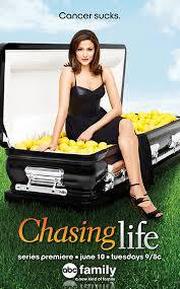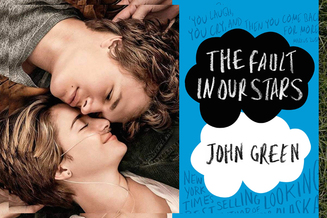When I watched The Fault in Our Stars, I thought it was a wonderful movie. However, I did not appreciate the fact that both Hazel and Gus were made to look so healthy and so mobile, despite the severity of their illnesses. Then there is Chasing Life, in which too much irrelevant drama masks the real challenges faces by young people with cancer.
When looking at either of those productions, I am frustrated by the inaccuracy. But my bigger issue with them is that they were even trying to portray the life of a teenager or young adult with cancer. I think it is close to impossible to incorporate the never-ending roller coaster of unimaginable challenges and incredible successes that come along with going through cancer treatment as a young person. That journey is different for each of us too, it is not some homogenous experience.
That is why I was really happy when an article from the Washington Post came across my Facebook news feed and the title was: “Hollywood has it wrong: I’m a teenager with an illness, and it’s not glamorous at all.” I encourage you to read the article here: http://www.washingtonpost.com/opinions/hollywood-has-it-wrong-im-a-teenager-with-an-illness-and-its-not-glamorous-at-all/2014/09/12/b9154a7e-38f9-11e4-8601-97ba88884ffd_story.html
The author of the article is a young adult with a serious illness, and therefore a reliable source I think. More importantly, she makes a truly awesome statement encompassing my own reasons for not liking media portrayal of teens and young adults with serious illnesses. This is what she writes:
“In some ways the show’s faux-realism could be considered positive. I understand the power of portraying sick teenagers as “normal.” No one should be defined by his or her illness. However, I would be lying if I said that my disorder did not shape who I am. Although my condition is under control, it is something that is always present, that I will have to struggle with. Yes, I am more resilient and thankful for the life I have. But I would give up that gratitude if it meant that I could have never been sick, because, along with newfound strength there is emotional exhaustion. Aside from feeling horrible physically, I became more guarded, unwilling to let even my closest friends know how I was coping. And there is the constant fear that my disorder will get worse again, that I will lose everything I have worked for.”
Like she says, it’s great to emphasize that teens and young adults who are seriously sick should not be defined by their illness. Then, she turns it around completely with the brutal yet utterly honest truth that none of those movies or shows include: just because we all want to stay positive and our lives have been positively impacted by the people and experiences that were part of our journey to recovery does not mean that we will ever feel “normal” or that we will ever totally recover. In my own case, I love the life I am leading now and the things I have been able to do thanks to the people I met and experiences I had during my relapse treatment. However… I will never be free of cancer because I will always be slightly afraid of another relapse, I will always be reminded of the impact it has on a person’s life because I will always know someone battling against it, and I will never be entirely certain of my future because my treatment may have late effects that do not surface until over a decade from now.
So, I look forward to a day when a popular book, movie, or TV show will portray the life of young people with serious illnesses in a realistic way: representing both the hopeful resilience we possess amidst the not-always-positive realities we face. I think it would be really cool to have something like that available so as to help people really understand the lives of teens and young adults who have or have had a serious illness. Even though I have finished my treatment and moved forward with my life, I will have blood tests each year and remain friends with other cancer survivors. So, cancer will always be part of my life in some way. There have been so many times that I wanted to tell my whole story to the people around me so that they would understand me: why I like to go out but not get drunk (because that would be really bad for my already worn out liver), why I like to smile and laugh as much as I do (because I had so much to be so sad about for so long and now I hate being sad), or why I don’t like to wear a bikini like everyone else my age (because I have stretch marks and scars that make me uncomfortable), or why I might be really quiet one day (because a friend of mine going through relapse treatment is not doing well).
That being said, in this blog, my main goal is always to encourage a positive attitude and hopeful outlook on life because I know it is crucial to combat all of those fears and concerns I just listed. I do not let my past medical history define my current life in any way, and neither should you. But, that does not mean it is not part of your life and that does not mean you need to ignore it. There is a big difference between coping and ignoring: if you ignore something you pretend it isn’t there, but if you cope with something you recognize the influence it has and attempt to coexist with it in a way that it no longer causes you discomfort. For me, learning how to cope with life during and after cancer treatment has been a continuous learning process. It is the lessons I learn along the way that I like to share with you here.
My most recent life-after-cancer-lesson has been to continue to find new ways to cope. Along the way, I have found so many ways to help myself stay positive and not let cancer affect me. Yet, as I progress through life as a survivor, I am realizing that cancer can affect me in an ever-growing number of ways and when I am impacted by it in some new way, I find myself totally unprepared to cope. One of my new favorite coping/distraction techniques is reading something interesting and writing about what I read. Processing something I read, especially if it is related to psychology or cancer, helps my mind to process how I feel (oddly enough). That’s kind of what happened, accidentally, with this article. I was feeling really bummed for a friend of mine who is facing some serious cancer treatment challenges and, as I was scrolling through my newsfeed, I came across the article. Suddenly, I had something to think about and analyze!
So, to get you started on your own analysis, I would love to know what you think! It would be awesome if you share your thoughts on the article and anything on your mind that is related to it by commenting below!


 RSS Feed
RSS Feed

